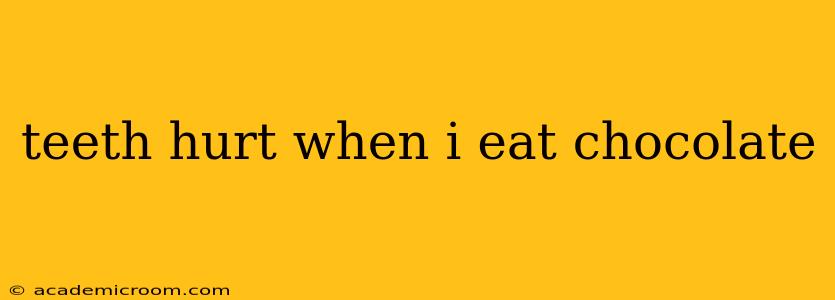Many people enjoy the delightful indulgence of chocolate, but for some, this treat comes with an unwelcome side effect: tooth pain. If your teeth hurt when you eat chocolate, you're not alone. This isn't just about sensitivity; it could indicate several underlying issues. Let's explore the common culprits and how to find relief.
Why Does My Tooth Hurt When I Eat Chocolate?
The pain you experience when eating chocolate can stem from various sources. It's crucial to identify the root cause for effective treatment. Here are some of the most common reasons:
1. Temperature Sensitivity:
Chocolate, especially when cold, can trigger pain in teeth with exposed dentin. Dentin is the layer beneath the enamel, and when enamel wears away due to erosion, grinding, or gum recession, the dentin's nerve endings become exposed, leading to sensitivity to temperature changes. Cold chocolate is a frequent offender here.
2. Acid Sensitivity:
Chocolate, particularly dark chocolate, contains acids that can erode tooth enamel over time. This erosion makes teeth more sensitive to both hot and cold stimuli, including the temperature of the chocolate itself and the acidic components within it. Regular consumption of acidic foods and drinks, including chocolate, can exacerbate this problem.
3. Tooth Decay (Cavities):
Cavities, or dental caries, are caused by bacterial acids that attack tooth enamel. When a cavity reaches the dentin, it can cause sharp pain, especially when exposed to sweets like chocolate. The sugar in chocolate can further fuel the bacteria responsible for decay.
4. Cracked Tooth:
A crack or fracture in a tooth, even a microscopic one, can cause pain when pressure is applied, such as when biting into a piece of chocolate. This pain can be unpredictable and vary in intensity.
5. Abscess:
An abscess is a pus-filled pocket that forms at the root of a tooth due to infection. This can cause intense pain that is worsened by pressure from chewing, including when eating chocolate.
6. Gum Disease (Gingivitis/Periodontitis):
Inflamed gums, a hallmark of gingivitis or periodontitis, can make teeth more sensitive and prone to pain when chewing. The sugar in chocolate can also worsen gum inflammation.
7. Existing Fillings or Crowns:
Sometimes, pain when eating chocolate might be related to pre-existing dental work. A cracked or poorly fitting filling or crown can allow food particles and bacteria to reach the sensitive tooth structure underneath, leading to pain and discomfort.
What Can I Do If My Teeth Hurt When I Eat Chocolate?
The best course of action depends on the underlying cause of your tooth pain. Here's what you can do:
1. See a Dentist:
This is the most important step. A dentist can accurately diagnose the problem through a thorough examination, X-rays, and other diagnostic tools. They can then recommend the appropriate treatment, which may include:
- Fluoride treatments: To strengthen enamel and reduce sensitivity.
- Desensitizing toothpaste: To help alleviate sensitivity.
- Fillings or crowns: To repair cavities or damaged teeth.
- Root canal treatment: If the infection has reached the tooth's pulp.
- Gum disease treatment: To manage and control gum inflammation.
2. Limit Chocolate Consumption:
While difficult for chocolate lovers, reducing your intake, especially of dark chocolate and chocolate with high sugar content, can help minimize irritation and enamel erosion.
3. Choose Milk Chocolate:
Milk chocolate generally contains less acid than dark chocolate.
4. Eat Chocolate in Moderation:
If you do choose to eat chocolate, do so in moderation.
Frequently Asked Questions (FAQ)
How can I prevent tooth pain when eating chocolate?
By maintaining good oral hygiene (brushing and flossing twice daily), limiting chocolate consumption, and visiting your dentist for regular checkups and cleanings, you can greatly reduce your risk of experiencing tooth pain.
Is it normal for teeth to be sensitive to chocolate?
Some degree of sensitivity is normal, but significant pain or persistent sensitivity warrants a dental checkup.
What kind of chocolate is least likely to cause tooth pain?
Milk chocolate generally has less acid than dark chocolate, making it a potentially less irritating option. However, moderation is key, regardless of the type.
Can I use a desensitizing toothpaste for chocolate-related tooth pain?
Yes, desensitizing toothpaste can help reduce sensitivity, but it's not a replacement for professional dental care.
Remember, consistent oral hygiene and regular dental visits are key to preventing and addressing tooth pain. If your teeth hurt when you eat chocolate, don't ignore it – schedule an appointment with your dentist to determine the cause and receive appropriate treatment.
